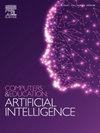职前教师在备课中使用人工智能的行为意向:双阶段 PLS-SEM-ANN 方法
Q1 Social Sciences
Computers and Education Artificial Intelligence
Pub Date : 2024-09-25
DOI:10.1016/j.caeai.2024.100307
引用次数: 0
摘要
在不断变化的教育环境中,技术的整合已成为重塑教学基础的必然力量。在这股变革浪潮中,人工智能(AI)的概念占据了中心位置,有望带来创新的方法和更高的效率。在此背景下,探究职前教师在备课中使用人工智能的行为意向成为一个需要研究的关键问题。本研究采用描述性横断面调查设计,采用目的性抽样技术,招募了 783 名职前教师。通过采用最先进的双阶段偏最小二乘结构方程建模-人工神经网络(PLS-SEM-ANN)方法,本研究探讨了以下基本变量对职前教师将人工智能纳入备课工作的意愿的影响:绩效预期、努力预期、习惯、享乐动机、社会影响和便利条件。社会影响是对职前教师在备课中使用人工智能的行为意向最重要的积极预测因素。此外,习惯、成绩预期、努力预期和便利条件也对职前教师在备课中使用人工智能的行为意向产生了重大的积极影响。相反,享乐动机对职前教师在备课中使用人工智能的行为意向没有显著影响。这项研究不仅从理论上加深了我们对教学法中技术整合的理解,还为完善促进有效人工智能整合的教育课程和教学策略提供了切实可行的建议。本文章由计算机程序翻译,如有差异,请以英文原文为准。
Preservice teachers’ behavioural intention to use artificial intelligence in lesson planning: A dual-staged PLS-SEM-ANN approach
In the ever-changing landscape of education, the integration of technology has become an inevitable force that reshapes the foundations of teaching and learning. Amidst this transformative wave, the concept of Artificial Intelligence (AI) has taken center stage, promising innovative approaches, and increased efficiency. Within this context, the exploration of preservice teachers' behavioural intention to employ AI in lesson planning has emerged as a critical issue for examination. This study used a descriptive cross-sectional survey design and employed a purposive sampling technique to recruit 783 preservice teachers. By employing a cutting-edge dual-staged partial least squares structural equation modelling-artificial neural network (PLS-SEM-ANN) approach, this study investigated the influence of the following essential variables on preservice teachers' intentions to incorporate AI into their lesson planning endeavours: performance expectancy, effort expectancy, habit, hedonic motivation, social influence, and facilitating conditions. Social influence emerged as the most significant positive predictor of preservice teachers' behavioural intention to use AI in lesson planning. Additionally, habit, performance expectancy, effort expectancy, and facilitating conditions substantially positively influenced preservice teachers' behavioural intention to use AI in lesson planning. Conversely, hedonic motivation did not significantly affect preservice teachers’ behavioural intention to use AI in lesson planning. This study not only enhances our understanding of technology integration in pedagogy from a theoretical standpoint but also provides practical recommendations for refining educational curricula and instructional strategies that promote effective AI integration.
求助全文
通过发布文献求助,成功后即可免费获取论文全文。
去求助
来源期刊

Computers and Education Artificial Intelligence
Social Sciences-Education
CiteScore
16.80
自引率
0.00%
发文量
66
审稿时长
50 days
 求助内容:
求助内容: 应助结果提醒方式:
应助结果提醒方式:


